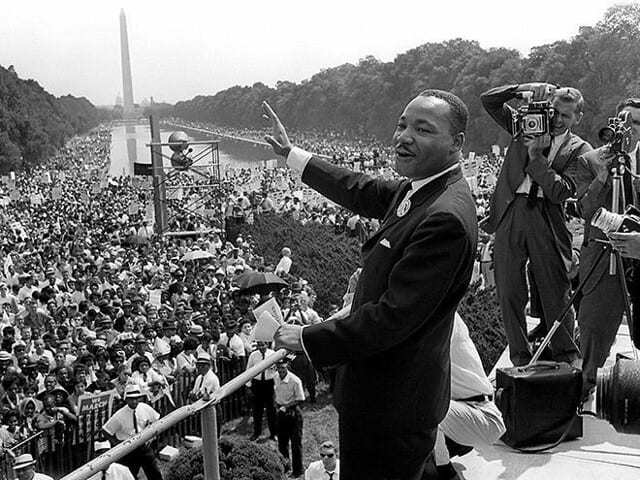
What is Martin Luther King, Jr. Day All About?
It is easy for us to confuse what Martin Luther King, Jr. Day and this weekend are about.
Some of us think this weekend is about football playoff games or college basketball. Many of us are just grateful for an extra day off from work this weekend.
I know people who seem to think the name Martin Luther King, Jr. is too long for a holiday. People talk about MLK Day. It does not help us understand what this holiday is all about.
We may have very little information about this man named Martin Luther King, Jr. Some of us believe he was a rabble rousing troublemaker and others see him as a dreamer. He falls into that category of people who lived a long time ago we name holidays after.
We may have heard his name but we have not heard his story. A few of us have attended schools or driven on streets named for him.
Some of us have a vague idea this holiday has something to do with racial justice.
Our first step toward understanding this holiday and the person for whom it is named can be by reading and watching. We can find Dr.King on YouTube and we can read the words he wrote.
This weekend is an excellent opportunity to begin spending time exploring Dr. King’s life and times.
When we take time to understand Dr. King’s background we can begin to appreciate why there is a holiday with his name on it.
As we learn about his experiences we are better able to put ourselves in his place. Our understanding of Dr.King helps us celebrate his holiday.
Who Was Martin Luther King, Jr?
Martin Luther King, Jr. was born in Atlanta, Georgia. He was born over ten years after Nelson Mandela, and over two years before Desmond Tutu were born in South Africa.
Dr. King is the only African-American person, as well as the only member of the clergy, for whom the United States has designated a national holiday. He was not a perfect person, but he accomplished a great deal in a short lifetime.
The eldest son of an African-American minister, he grew up in a relative comfort within a segregated society. The church and the expectations of his family played central roles in his early life. A graduate of Morehouse College, he attended seminary in Pennsylvania and did his doctoral work at Boston University. In graduate school he became familiar with the thinking of Christian theologians including Walter Rauschenbusch and Reinhold Neibuhr, as well as the writing and work of Leo Tolstoy in Russia, Henry David Thoreau, and Mahatma Gandhi in India.
At home in the world of education and ideas, he worked throughout the rest of his life to put his core values into practice, to make a meaningful difference.
After completing his education at the age of 25, Rev. Dr. Martin Luther King, Jr., became the pastor of Dexter Avenue Baptist Church in Montgomery, Alabama. Six months after arriving, he was asked to take a leadership role in an effort to change Montgomery’s policy of segregation in public transportation.
Dr. King’s life and accomplishments were shaped by his earliest experiences. His speaking and writing, and his work to bring more justice and reconciliation to American society, grew out of his own personal values and the values of the people he inspired around him.
He was shot and killed when he was 39 years old in Memphis, Tennessee.
How We Practice Martin Luther King, Jr. Day
Many of us have complex traditions for how we spend certain holidays while we apparently ignore others. I know people who have complicated networks of practices for Valentine’s Day and Thanksgiving, for example.
Some of us may think Martin Luther King, Jr. Day only became a holiday recently. We have not taken time to decide what our practices will be. Each year we think about what we would like to do, but then we are tired and we end up doing nothing. Our Martin Luther King, Jr. Day practices are remarkably similar to how we practice Saturdays.
This year, since we are exploring Dr. King’s life and writings, we have an opportunity to change our practices.
Reading and watching Dr. King can be a good place to begin. We may be able to find places where the words he wrote will be read on his day and we can listen with others. Some of us will want to read or listen and spend some time reflecting on what he said.
We might want to spend some time by ourselves listening to sacred stillness and considering how to practice Dr.King and his holiday.
Each of us can find our own ways to practice.
A Contemplative Approach to Martin Luther King, Jr. Day
Our understanding of the life of Martin Luther King, Jr. shapes our practices of his holiday.
We explore who Dr. King was and what he did. Some of us take time to watch him on video and read the words he wrote. We learn about his experience and his teachings.
Reflecting on Dr. King includes understanding the wisdom we find about him in our culture, our own spiritual tradition, our own experiences, and what we believe. As we reflect we begin to find our own questions and insights about Dr. King and his holiday.
Spending time with our insights and questions shows us how we will practice Martin Luther King, Jr. Day. Each time we reflect gives us new questions and new insights which shape our practice.
Martin Luther King, Jr., like all of us, was a complex person. The more we understand the deeper our practice becomes.
Our understanding of Martin Luther King, Jr. shapes what bis holiday is about for us.
What understanding of Martin Luther King, Jr. will we put into practice today?
How will our questions and insights about Martin Luther King, Jr. shape our behavior?
[Image by National Park Service]
Greg Richardson is a spiritual life mentor and coach in Southern California. He has served as an assistant district attorney, an associate university professor, and is a lay Oblate with New Camaldoli Hermitage near Big Sur, California. Greg’s website is StrategicMonk.com and his email address is [email protected].












